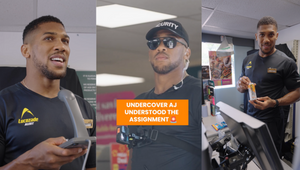
Knock Knock. Who's there? What Marketers Can Learn from Stand Up Comedy

As the world seemingly burns around us, laughter becomes a vital distraction and escape from our worries.
Surprising then is that a recent Kantar study, which analysed 200,000 global ads – reported a stark decline in the use of humour in ads. Their data shows that in 2004 more than half (53%) of ads were funny or light-hearted – or at least tried to be. But this proportion has steadily declined, so that now barely a third (34%) make any attempt at humour.
As if the brooding threat of a collapsing world wasn’t bleak enough, we’re being bombarded with joyless advertising. Where did all the fun go?
I remember cracking up at the telly, watching a fisherman get roundhouse kicked by a grizzly bear. When was the last time a tuna advert made you laugh? A while ago I bet.
But with 53% of consumers saying they are most likely to remember and enjoy an advertisement if it’s funny, clearly, there’s a huge opportunity for brands.
So what comedic principles can we use to flog our products?
Human Truth
“Comedy is the art of telling the truth about what it's like to be human.” Steve Kaplan.
The best comedy is centred around human truths. With the rapidly changing landscape in which we are living, human nature has become one of our only constants. There are universal emotions and experiences which we all share and empathise with. And comedians use these truths to create relatability with their audience, as well as bringing us together by laughing at something that’s so universally true, we can all agree on it. That’s why at the core of every great brand or idea, there’s a universal truth with which everyone can resonate.
In 2021, Snickers discovered its truth: ‘You’re not you when you’re hungry’. As you’re reading this, I’ll make the assumption you are a human. And as a human, you’ll be aware that we all experience hunger, which can lead us to behave differently from how we might typically behave. They then ran with this truth, using comedy to dramatise the problem, which provided them with a platform on which they could build and build - something they are still capitalising on today; because it remains universally true. You’re not you when you’re hungry – and our chocolate and nut-based bar is the solution to that problem. So do as the comedians do, and do some digging into the human truth of your brand. Only then can your brand create a story worth remembering.
Self Deprecation
All too often we can fall into the trap of taking ourselves too seriously. When in fact, one of the most liberating things we can do is laugh at ourselves. By being vulnerable, comedians expose themselves to ridicule, but in doing so, become intrinsically relatable. Stand-up comics build tension with their stories, by highlighting their own personal conflicts or pain.
As an audience, we cautiously follow along, until they finally release the tension with a punchline - that invites us to laugh along at their misfortune. We’re not laughing at them though, we’re laughing alongside them, and at the same time laughing at ourselves as we recount our own familiar errors.
Self-deprecation and its intrinsic vulnerability can be important in showing consumers another side of yourselves, and in some cases, differentiating yourselves from the competition.
KFC famously used self-deprecation to flip the script on its chicken shortage back in 2018. #Chicken crisis became international news, as their supply issues led to a huge outpouring of negative sentiment and disparaging media coverage. In such a PR crisis, it would be natural to run around like a headless chicken. But a simple press ad, with a three letter headline helped disarm a nation of furious fried chicken lovers. They’re sick of empty corporate apologies.
The key differentiator here is the self-deprecating tone they used. KFC was brave enough to hold their hands up but used humour and a conversational tone to disarm people’s frustration. Transforming them from a corporate brand facing supply issues, to a slip-up from a relatable, funny friend. Very fcking clever.
Bravery
The one thing all comics share is their bravery. The bravery to step up on stage, in front of a sea of people, in an attempt to make them laugh. A literal nightmare for the majority of people. When done well, comedy captivates people.
By making us laugh and feel good we are compelled to listen, hanging off their every word. Bracing ourselves for what they’ll come out with next. But when it goes bad, there’s a chance the audience won’t listen. Even worse, there’s a chance they’ll berate the person on stage, leaving them running for the exit with their tail between their legs.
And this is what has led to decline in the use of comedy in advertising. Brands are fearful that if they misuse humour they’ll be booed off the stage. That’s why it’s crucial to work with people who have made a career out of being funny; stand-up comics, comic writers, and even popular content creators. TikTok, for example, has become an excellent tool for propelling the most engaged comedic content. Offering up talent who are switched on to what humour is resonating.
But as any good comic knows, being funny requires courage. So the opportunity is there, and customers are pining for it, but who will be brave enough to step up and crack a joke?















